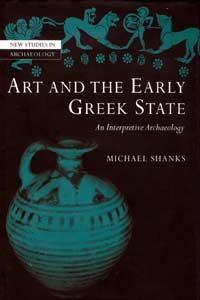
For ten years (1988-98) I explored themes of society, art and design in ancient Greece and the Mediterranean - a study of rather exquisite perfume jars made in Corinth in the eighth and seventh century BC, when the city was first being built. The result was two major journal papers, a book on the discipline of Classical Archaeology ( Classical Archaeology of Greece) and this one about art and society in the ancient Greek world.
The message - the Greek city state is as much about the way the bodily experiences and pleasures of different male subcultures were remodeled in new architectures and urban spaces, as it is about a Greek cultural genius inventing European civilization. The invention of the democratic Greek body politic was about the way different groups of men defined themselves through the way they ate, walked down the street, fought together on a field outside the city on a summer afternoon, talked in political assembly.
This generated controversy.
Anecdote. I was interviewed for a fellowship at an Oxford college. The statistics expert liked my work. The Greek philologist was incensed that I had been invited to interview and denounced me to the committee as a communist because I was critical of the class culture of Greek aristocratic men!
Anecdote. A few months later in 1992 I was invited to present my work at a conference on ancient Corinth. It was to be held at a university that had a reputation for wanting to keep the study of classical antiquity alive and well, making it relevant to today (and George W. Bush does have a fondness for quoting Classics, the likes of Cicero!). So I analyzed the imagery of my perfume jars (flowers, animals, monsters, men) alongside Stanley Kubrick's movie Full Metal Jacket and Shinya Tsukamoto's Tetsuo-Iron Man. The point was that the juxtaposition of these images of ancient Greek soldiers, American GIs, and Japanese metal fetishists generates insights into the psychology, the gratifications of war and violence. Four people walked out of my talk and the comments afterwards were vitriolic. I had made a big mistake about the stakes at play. I had imagined there would be appreciation for a contemporary understanding of the ancient city state. But most of those who celebrate the relevance of Classical antiquity are not looking for new more nuanced understanding. They want the old values enshrined in the study of Classical antiquity renewed and appreciated again. There is no new message for these people, just a promotion of the old one of the cultural genius of the Greeks at the birth of European civilization. What I proposed was a picture of the Greek city that they did not recognize or want to recognize, because it connects with contemporary concerns in a different way. This discovery of difference in what we have taken to be the familiar stories of history is a major component of my work. This kind of thing is nothing new, actually, to Classical Studies: Jane Harrison's anthropology over a century ago, Georges Bataille and René Girard have explored themes related to those in my own work.
Here are the chapters of the book in editable PDF (this means that there are a few mistakes as a result of OCR)
Some notes on my work in the archaeology of ancient Corinth -
 Titles.pdf
Titles.pdf